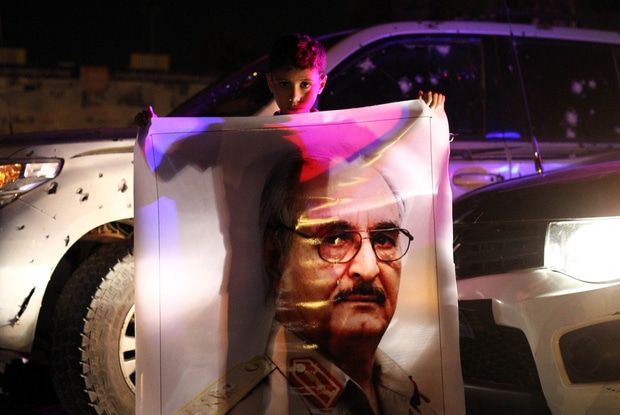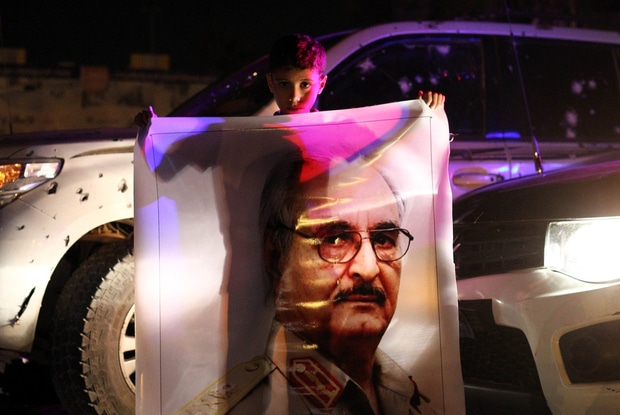On the 3rd of June, Khalifa Haftar’s Libyan National Army (LNA) gained its most significant strategic military victory in the southern part of the country which now means that almost two thirds of Libya is under Haftar’s LNA control.
This may prove to be a game changer in the six year struggle for power after the US and UK-led attack on Libya in 2011.
The LNA entered the southern town of Waddan in Jufra and overran the area. The nearby town of Sukna was taken by the LNA. Haftar’s forces then captured the strategically important Jufra AFB which will give it air striking coverage of much of western Libya and make a direct route, logistically and tactically, without significant obstacles, for them by road from East to West Libya when the route is reinforced by troops.
This victory could prove to be the most decisive one for the LNA since its creation by Haftar.
The LNA were up against Tripoli’s Government of National Accord (GNA) militias that mostly comprised of the Benghazi Defence Brigades (BDB), and disturbingly supported by Chadian mercenaries.
It looks like either the UN-created Government of National Accord (GNA) and the Presidential Council (PC) accepts the recent “olive branch” from Hafter and the LNA or Hafter will continue military objectives until he overcomes Tripoli itself, which many see as the last battle.
Thus, Haftar’s LNA is in striking distance to conquer the remaining third of the country. Both Tripoli and Misrata may be forced to accept Haftar’s LNA victory and oust Muslim Brotherhood Sect (MB) and al-Qaeda members and sympathizers, and Libyan Islamic Fighters Group (LIFG) who have been implicated in the recent Manchester suicide bombing. Their alternative is to face what will be a very ugly LNA campaign to eradicate all terrorists when they seize Tripoli and Sabratha.
If this is how Libya plays out, a “plan for the peace” after the war will be needed — something the US and UK spectacularly failed to do in recent history in Iraq.
This raises the issue of a very controversial subject: the slain Libyan leader’s son, Saif Gaddafi. The events in and around Jufra are connected to Libyan “militias” in Tripoli releasing some Gaddafi era nobles including Saif’s brother, Saadi and former prime minister Baghdadi Ali Mahmudi from prison.
These developments are part of a new dynamic that seems to be entering the Libyan stage. The idea is to establish a Truth and Reconciliation Commission, similar to Mandela’s South Africa’s, in order to bring unity to the country. Specific Libyan tribes are starting to back Saif Gaddafi and if, and that is the biggest if, he had the backing of Haftar, a new and hopefully peaceful attempt at unification may appear when the fighting stops.
When Saif was released from his Zintan prison last year, the question to what role he could play in the war-torn country immediately became a legitimate and relevant subject.
It is rumoured that Saif is contacting people inside Libya and abroad who are supporting his involvement.
To boot, Saif is playing a role now in Libya’s important tribal structure. Most of the tribes that supported his father, Muamar Gaddafi, see him as a redeemer and are willing to support his involvement in any political process that helps to bring about national reconciliation.
Haftar could, if he chooses, become an advocate of the involvement of a Gaddafi offspring.
Haftar is close to Elders of the Warfalla tribe. The Warfalla tribe is the biggest tribe in Libya located mainly in Bani Walid and Sirte area, along with the Warshfana tribe and both tribes are against extremists and many are sympathetic to Saif Gaddafi.
Importantly, the tribes believe that Saif can help reach an accommodation with Libyan parties in a Mandela style Commission to forgive or prosecute, where appropriate, crimes committed pre and post 2011.
As far as the warrant for Saif issued by the International Criminal Court (ICC) in The Hague, it appears to have little substance though it is another question.
Haftar is forcing now the final battle; the reality on the ground is that Haftar’s LNA is winning and is popular, while simultaneously it has to be said that Saif Gaddafi is also becoming popular amongst a large segment of the Libyan people.
Any planned solution to a post-civil war Libya must be considered even one involving a Gaddafi family member.
Either way, the civil war seems to be now all but over and won by the LNA and its political master, the elected parliament, the HOR, unless due to outside foreign interference it turns into a greater quagmire.


